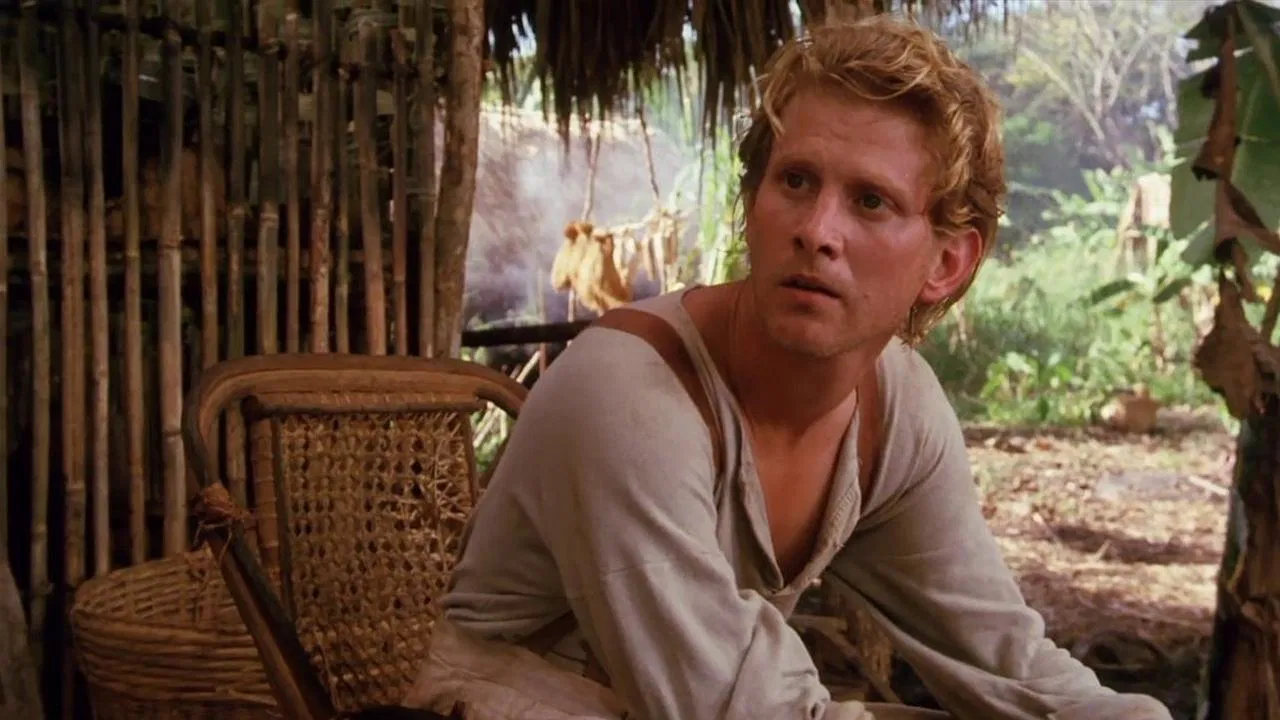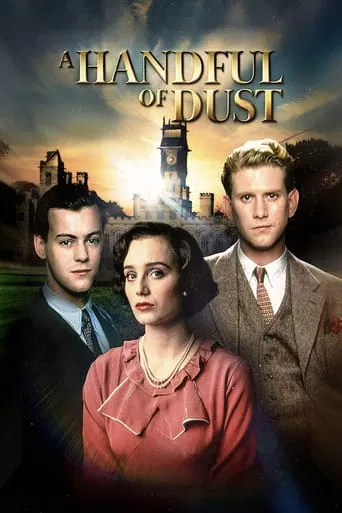WillSushyMedia
This movie was so-so. It had it's moments, but wasn't the greatest.
ChanFamous
I wanted to like it more than I actually did... But much of the humor totally escaped me and I walked out only mildly impressed.
Mandeep Tyson
The acting in this movie is really good.
Dana
An old-fashioned movie made with new-fashioned finesse.
Bill Slocum
"A Handful Of Dust" strikes one as a butterfly on a pin, beautiful to look at but rather pointless, apart from what's holding the poor butterfly. This cinematic adaptation of the Evelyn Waugh novel has all the same pieces, but lacks a sense of purpose beyond its own pointless existence.In 1930s England, we meet Tony Last (James Wilby), country squire and "rather a stick" who dotes over his son and his grand but decaying estate, Hetton. This doesn't sit well with wife Brenda (Kristin Scott Thomas), who pines for the party scene in London. "I just thought it would be fun to eat someone else's food for a bit, that's all," she says when Tony shoots down a suggestion to pay a visit on one of her friends. Brenda has other options, it turns out, a young man named Beaver (Rupert Graves) with whom she takes up an affair that is common knowledge to everyone but Tony until a horrible accident brings everything in sharp focus.There's nothing here not covered better in the novel, which has its own problems in terms of structure (namely an incongruous last act set in South America) but captures wonderfully a jaded social scene Waugh inhabited but despised. Reading "Handful Of Dust" is to be immersed in a world of clever beastliness, but an inert quality of cold cynicism hampers the film, which by following the novel as closely as it does suffers for the lack of Waugh's jabbing narration.The principal actors all play their roles capably enough, but none find the right angle or empathy to make the film either wicked fun or emotionally involving. Judi Dench comes closest as Beaver's mercenary mother, crowing about a fatal house fire she expects to make money off redecorating. "Luckily they had that old-fashioned fire extinguisher that ruins everything," she purrs. But neither she nor any of the other savage Londoners that abet Brenda's cruelty give you much to hold onto. They say their lines, make their point, and the film rolls on.Alec Guinness shows up late in the film as Mr. Todd, a sinister character who takes advantage of Tony in a curiously quaint way. "There is medicine for everything in the forest, to make you well...and to make you ill," is about as openly threatening as he gets, and it is enough. Still, even he doesn't bring enough life to the proceedings to make the film take off.Director Charles Sturridge, who also co-wrote the film, gets in a lot of pretty pictures of period London and the rain forest, but he doesn't seem to have much of a vision of his own beyond capturing Waugh on film the same way he did with "Brideshead Revisited," the 1981 miniseries he co-directed. "Brideshead" though had many more hours to develop its subtle themes, and a better story besides of grace as well as ignominy. "Dust" just has the ignominy. It is not enough.I really liked only one performance in the entire film, that of Alice Dawnay as a little girl named Winnie who accompanies her mother to Brighton and doesn't see why she can't have a seaside holiday even if her mother's there to help Tony amass evidence of sexual infidelity for a quick divorce. The girl's scenes with Wilby have the right lightness and energy to suggest a film moving on its own power, and not just going through the motions.But for the most part, "Dust" delivers only a sad tale of ruined lives that fails to make you care about anyone who is in it. There's nothing in it that really stinks, yet the lack of a real point really hurts it in the end.
Tweetypez
I was hopeful when this film started that it would be very enjoyable, the setting was my favorite, a big manor house in the country of England, and the genre being a period film, is also my favorite. But as it got on, I was not happy with where the plot was going. The actors did a fine job. Except for Kristin Scott Thomas's character, the self-centered Brenda Last, the character development was not good. James Wilby as Tony Last was very good, he made me really root for this character and I suppose that is why I hated the end so much. He deserved a better ending. Rupert Graves as John Beaver, was quite dull with no charisma, so I couldn't figure out why Brenda would fall for him. There were some great actors in the cast: Judi Dench, Angelica Houston, and Alec Guinness etc. The story did nothing to allow these great actors to really show their stuff. Angelica's role was a cameo at best. Judi Dench had a bit more lines, but really also a cameo.Additionally, the Brazil part of the movie seemed quite out of place. I'm sorry, but the end left me feeling cheated and saying "What?!". Not my cup of tea. I was going to recommend it to a lady I know that likes period films, but after it was over, I changed my mind.
patrick powell
An 18th-century English writer, Lady Mary Wortley Montagu, once wrote (putting Alexander Pope in his place): "Satire should, like a polished razor keen, wound with a touch that's scarcely felt or seen". This is exactly what Evelyn Waugh's novel A Handful Of Dust does and the film, in my view, fully does the novel justice. Waugh's satire here is very underplayed, very understated and very funny, but none the less utterly lethal for all that. Charles Sturridge and his fellow screenwriter's have, as far as I can see, stuck extremely close to the novel, which is no bad thing as Waugh was an extremely economical writer and there would be little point in trying to gild the lily. Although Waugh wrote his novel as a young man, his thorough dislike of modernity - which he regarded as insincere cant - in every shape or form is already apparent and he mercilessly sends up its more vicious aspects. But Waugh was too intelligent just to hate for hate's sake: it was the loss of admirable qualities in favour of 'progress' which upset him. So in the novel and film Tony Last behaves well to everyone despite a great many people, not least his 'modern' wife Brenda, treating him appallingly badly. He is loyal, values tradition, honest, accommodating and indulgent and in return loses everything. Brenda is conventionally sweet but is simply a self-centred monster who lives without a thought for anyone, and always gains what she wants. One reviewer here complained that 'nothing' happens in the film. Not a bit of it. A great deal happens but everyone is so polite and well-brought up that no one, not even Tony, questions the huge injustice of it all. If you are reading these reviews while considering whether to see this film, bear in mind the quotation with which I started my contribution: Satire that's 'scarcely felt or seen'. That will give you the key to enjoying a very good film indeed. (NB The full quotation putting down Pope runs: "Satire should, like a polished razor keen, wound with a touch that's scarcely felt or seen. Thine is an oyster knife, that hacks and hews, the rage but not the talent to abuse.")
jackie-107
At the end of this film, one wants to wash one's hands of the unmitigated cruelty pervading the atmosphere. The deliberate pace of the thirties setting (beautifully portrayed using the right houses, and suitable sets and costumes) ensures that every nuance of behaviour is clearly understood by the audience, and this is the great strength of the film. As I haven't read the book, but believe this is a faithful adaptation, I can commend both Charles Sturridge and the superb actors for translating what must be a difficult, but brilliant, novel by Evelyn Waugh, not only into an impressive film, but one that conveys thirties morals and social privilege in a way that rings true for today's 21st century attitudes. I think this is the best performance I have ever seen by James Wilby. Cuckolded by his wife (Kristin Scott Thomas in a fantastic debut performance), suffering from the death of his only son, he turns from a kind and gentle husband to one who wreaks revenge on his wife by cutting off all financial support. His agony over his son is exactly restrained in the manner of the period, his embarrassment over setting up the grounds for divorce by being caught in flagrante, his bewilderment when one would think he should be released from torment but is trapped by a vindictive eccentric (Alec Guinness, as usual, quite amazing) in the middle of the jungle, after nearly dying of fever, is a tour de force. This is his film, but Kristin Scott-Thomas (who was the original reason I watched this film in the first place), is simply delightful as the spoil, bored wife who can't resist Rupert Graves's boyish charm and dilettante lifestyle. No wonder Robert Altman chose her for Gosford Park; she is made for these roles. Her character's brittle insouciance, total selfishness and insensitivity, her lack of concern for her husband and son while she pursues alleviation from boredom with Rupert Graves, is reminiscent of Daisy Buchanan's behaviour in The Great Gatsby. Kristin Scott-Thomas shows a sophistication and acting aplomb which is breathtaking.Rupert Graves is convincing as the shallow man-about-town sponging off others but seducing charming to the ladies; Judi Dench gives a lovely cameo as his bourgeois mother; Cathryn Harrison is good as Millie, who is supposed to provide the evidence for the divorce; and Alec Guinness in one of his final roles, is chillingly menacing. I recommend this movie to anyone who enjoys a good story well told, excellent acting, and a period setting.

